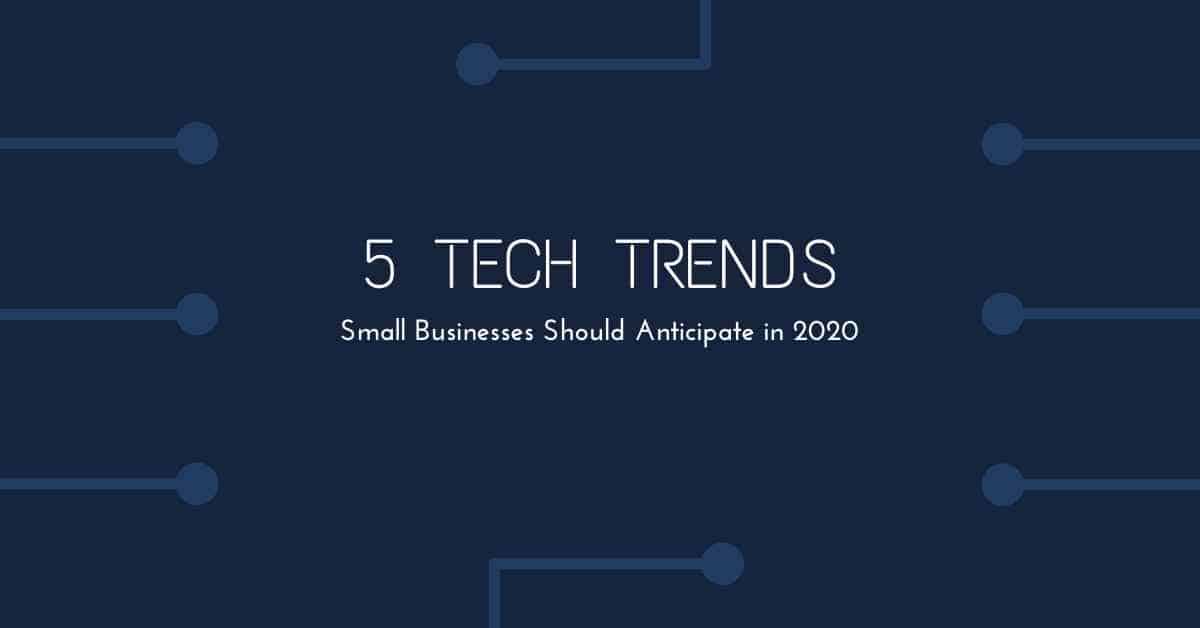Spiceworks’ The 2020 State of IT reports that 88% of businesses expect increased IT budgets over the next year. In the report, small businesses with 100 employees will allot their budget according to the following percentages:
- 35% for hardware
- 31% for software
- 22% for hosted and cloud-based services
- 11% for managed services
The growing need for implementing better technologies and IT strategies will result in increased spending for small businesses. In fact, the report also says that 44% of businesses will increase their tech spend in 2020, 6% higher than in 2019.
As IT continues to become an integral part of business processes, small businesses must keep up-to-date on the latest business technology trends. Understanding key trends will enable small businesses to effectively plan their strategies, take on new opportunities, and drive business growth.
That said, here are five tech trends small businesses should prepare for in 2020.
Mobile is more important than ever
 In this day and age, it’s difficult to stay competitive if your website isn’t fully mobile-friendly and accessible. In 2020, mobile usage will continue to grow and become more relevant as consumers use their mobile phones to access information and pay for products and services online and offline.
In this day and age, it’s difficult to stay competitive if your website isn’t fully mobile-friendly and accessible. In 2020, mobile usage will continue to grow and become more relevant as consumers use their mobile phones to access information and pay for products and services online and offline.
Aside from this, many companies are leveraging on mobile apps to attract and meet consumer demands according to Invesp. 56% of mobile and tablet users use their device to search and buy gifts, especially during the holidays. In addition, “32% of shoppers changed their minds about purchasing items after checking out the product information on their mobiles within brick-and-mortar stores.”
Lastly, because Google implemented mobile-first indexing last July, making your website mobile-friendly allows it to rank higher for mobile search results. This means that easy-to-use buttons, speedy page loading, and proper mobile format will contribute to ranking your website higher on mobile. Optimising your site will allow your business to gain a wider and better online presence, and ultimately, become visible to your target audience.
AI will be used for prompt and personalised customer service
Benchmark data from InsideSales.com and Harvard Business Review reveals that the best time to respond to a new lead or enquiry is within the first five minutes. To maximise such time and better cater to clients or customers, one of the business tech trends that companies will continue to adopt is AI for user experience.
Even in small ways, AI and algorithms help companies improve their customer experience across all industries. From adding voice technology on infotainment systems or devices to even your listening experience on Spotify, AI has become seamlessly integrated into the consumers’ lives.
“Today’s chatbots and virtual assistants are able to handle more customer service tasks than ever before to better facilitate the customer journey. Opportunity to solve customer issues as soon as possible which are related to cancelation their order, changing their order details or courier services make a great impression on customers. As they utilize machine learning to better respond to customer requests, these interactions become even more efficient,” founder and CEO of VividTech Omer Khan told Entrepreneur.
This 2020, more businesses will opt to personalise their approach to their audience and only showcase information that would only appeal to their consumers. According to Gartner, businesses will use smart personalization engines to identify customer intent. Implementing this will increase business profits by 15%.
However, because building AI-based systems will be expensive for small businesses, many have turned to outsourced managed IT services, or even hiring offshore AI developers. Hiring third-party service providers allow small businesses to increase their overall productivity while cutting down on costs.
While AI becomes an important aspect for any business to consider, businesses must remember that AI still can’t replace a human worker. AI is only there to make processes more efficient so that human workers can better cater to their customer’s needs. According to Sherrie Ashley, the co-founder of PeopleFastFind, the best way to implement AI is to apply it at the right time. In critical and urgent situations, the best person to talk to is another human.
Automation becomes the norm
Automation has long been one of the most popular technology trends in business in recent years. It’s a technology that automates or digitizes a process that once required humans. Now, we have come to the time where automation will no longer be a trend; rather, it will be a necessity for every business to apply automation in their processes.
The 2020 State of IT The Annual Report on IT Budgets and Tech Trends predicts that adoption of AI-powered technologies will triple by 2021, while adoption of edge computing will double.
Small business owners might think automation is too big or complicated for their business, but automation has now become more feasible for small companies. Small types of businesses can use automation in a variety of business processes such as accounting, data entry, data management, customer service, and email marketing.
Making these processes automated for your business will allow your business to become more efficient and stay competitive. Automation enables small business owners to focus on more important tasks such as improving business strategies and creating effective marketing campaigns.
Also, don’t be afraid of bringing automation into your business. A recent report by the World Economic Forum stated that 75 million jobs will be displaced by 2020, but automation would also create 58 million new jobs. For a small business, this does not mean laying off some employees. Instead, this can be an opportunity to specialise current employees into certain roles that will benefit the business.
Social media management is difficult but necessary
 A survey from Clutch reveals that more than 70% of small businesses used social media in 2018, and that is still predicted to grow in the next few years. As such, it’s important for businesses to leverage social media channels to gain attraction.
A survey from Clutch reveals that more than 70% of small businesses used social media in 2018, and that is still predicted to grow in the next few years. As such, it’s important for businesses to leverage social media channels to gain attraction.
According to Cox Blue, below are the key areas that small businesses should keep an eye on:
- Creating credible profiles. Establishing your business not only as a business but also as an industry expert increases your online presence and overall business credibility. Businesses can do this by engaging with customers, supporting employee advocacy, and creating online communities.
- Exploring different channels for your business. With so many online social platforms today, Facebook and Instagram are no longer the only effective online platforms for businesses. Among other social media channels, Pinterest and TikTok are gaining popularity in businesses and consumers. The best way to reach your audience is to take note of which channels they often use.
- Leverage social media for customer service. According to 2018 data from Sprout Social, 45% of consumers reach out to social media when they have concerns. That is why 88% of social marketers believe that social media is an important tool for customer service, according to the same data. Engaging with your social media audience not only increases brand visibility but also builds trust between the business and consumers.
Aside from these, one of the social features that’s gaining popularity for consumers and businesses are Stories. These are short “in-the-moment” video content that disappears after 24 hours. First introduced by Snapchat, stories have now become a default feature in every social media channel.
According to TechCrunch, stories are growing 15x faster than social feeds. Because of this popularity, it will become one of the major features that brands will use to convey their message and connect with their audience.
For small businesses, this means that creating trendy but valuable campaigns become more difficult as businesses need to capture their audience’s attention via genuine and relatable content.
More small businesses will avail managed IT services
Managed IT services offer small businesses opportunities that are not possible with a small IT team. These include improved data security, 24-hour monitoring, and increased scalability, among others. At its core, managed IT services often mean assigning IT tasks and operations to a third-party service provider at an affordable cost.
According to Mordor Intelligence, the global managed services market is expected to rise from USD 166.8 billion in 2018 to USD 319.5 billion by 2024. That’s an 11.5% compound annual growth rate in a span of five years.
Based on the same report, the market will be specifically interested in managed mobility and information services. Because of its growing demand, the report says that small and medium businesses are expected to spend 25% more on managed IT services.
Deloitte’s 2019 Tech Trends report showed that in-house roles are estimated to take up as much as 70% of a company’s IT budget. For small businesses, this isn’t an efficient and cost-effective system to apply especially if a company aims to expand its IT infrastructure. Aside from this, one of the upsides of outsourcing managed IT services for small businesses is the opportunity to tap on a specialised or expert IT team.
Will tech shape small businesses in 2020?
Definitely.
Aside from adapting to the ever-changing market, small businesses must also now continually adapt to current tech trends to stay ahead of the competition. To make the most out of these trends, it’s important to implement the strategies or methods that can greatly help or solve a problem in your business and influence your business’ future growth.
As a small business owner or leader, it is also part of your duty to always be in the know of future business technology trends to be able to identify which areas in your business can still be improved. With the right research and strategies fit for your market, your business can reach new heights this 2020.
by Josephine Mariñas
Josephine Mariñas is a Content Specialist at Cloud Employee, a UK-managed provider of tech talent in the Philippines. She’s currently focused on email marketing and covering the latest UK tech news for Cloud Employee’s blog.
